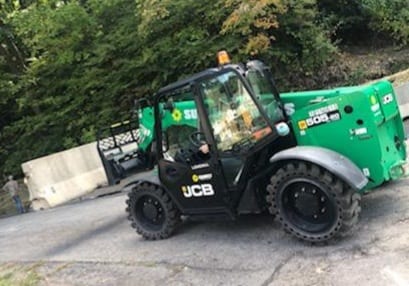Ways to Connect a Kenco Barrier to a Forklift
Connecting a Kenco Barrier Lift to a forklift effectively requires the right equipment and setup to ensure safety, efficiency, and compatibility with the specific barrier lift model and forklift. Here are the best ways to connect a Kenco Barrier Lift to a forklift, based on available information and best practices:
- Use a Kenco Forklift Adapter (FLA12K or FLA20K)
- Description: The Kenco Forklift Adapter is a dedicated attachment designed to expand the lifting capabilities of a forklift, allowing it to interface seamlessly with Kenco Barrier Lifts, Pipe Lifts, or other lifting attachments. It converts the forklift into a rigging machine suitable for lifting concrete barriers.
- How to Connect:
- Slide the Forks into the Adapter: Insert the forklift forks into the rectangular tubes of the adapter (e.g., FLA12K with 12,000 lb capacity or FLA20K with 20,000 lb capacity).
- Secure to the Bulkhead: Attach the adapter to the forklift’s bulkhead to prevent movement.
- Attach Safety Chains: Use the provided safety chains, connecting from the bulkhead eye to the two top eyes on the adapter to prevent sliding during operation.
- Connect the Barrier Lift: Use the built-in lifting eye on the bottom of the adapter to attach the Kenco Barrier Lift via rigging, such as the Kenco RigMAX sling assembly.
- Advantages:
- Specifically designed for Kenco lifting products, ensuring compatibility.
- High capacity (12,000–20,000 lbs) suitable for most Kenco Barrier Lifts (e.g., KL9000, KL12000, KL16000).
- Easy to install, minimizing downtime.
- Available in low-overhead versions for confined spaces like warehouse doorways.
Considerations:
- Ensure the forklift’s load capacity matches or exceeds the combined weight of the adapter, barrier lift, and concrete barrier.
- Inspect the adapter for damage before use, as per Kenco’s guidelines.
- Direct Rigging with a Sling System (RigMAX Kit)
For forklifts without a dedicated adapter, a Kenco Barrier Lift can be connected using a sling system, such as the Kenco RigMAX kit, which provides the necessary rigging components to attach the lift to the forklift’s mast or carriage.
How to Connect:
- Attach Rigging to Forklift: Secure a sling or cable to the forklift’s mast or a designated lifting point on the carriage, ensuring it is rated for the load (barrier lift + barrier weight).
- Connect to Barrier Lift: Attach the sling to the lifting eye or bail on the Kenco Barrier Lift (e.g., KL9000V4, KL12000, or KL30000).
- Verify Stability: Ensure the rigging is properly tensioned and the barrier lift is centered to prevent swinging or imbalance during lifting.
- Test Lift: Perform a low test lift to confirm secure attachment and stability before moving the barrier.
- Advantages:
- No additional adapter required, reducing equipment costs.
- Compatible with a wide range of Kenco Barrier Lifts, from 9,000 to 40,000 lb capacities.
- Flexible for use in various job site conditions.
- Considerations:
- Requires careful rigging to avoid load imbalance or detachment.
- Forklift operators must be trained in proper rigging techniques.
- Regularly inspect slings for wear, as per OSHA and ASME B30.20 standards.
- Custom Forklift Adapter with Integrated Spreader Beam
- Description: For heavy or oversized barriers, such as those exceeding standard jersey wall dimensions, a custom Kenco forklift adapter with an integrated spreader beam can be used. This is ideal for high-capacity lifts (e.g., 20-ton capability) and specialized applications.
- How to Connect:
- Consult Kenco Engineers: Contact Kenco to design a custom adapter tailored to your forklift and barrier lift model (e.g., for KL30000 or double barrier lifts).
Install the Adapter: Slide the forklift forks into the adapter’s tubes and secure with safety chains, similar to the standard FLA12K/FLA20K.
- Attach Barrier Lift: Use the lift eyes on the spreader beam to connect the barrier lift via chains or slings.
- Test and Certify: Ensure the custom adapter is tested and certified by Kenco before use, as was done for Forterra’s 20-ton adapter.
- Advantages:
- Handles oversized or non-standard barriers, such as Texas Low Profile or T-walls.
- High lifting capacity for large-scale projects.
- Engineered for specific job requirements, ensuring safety and efficiency.
- Considerations:
- Higher cost and longer lead time due to custom engineering.
- Requires precise specifications for the barrier and forklift to be provided to Kenco.

